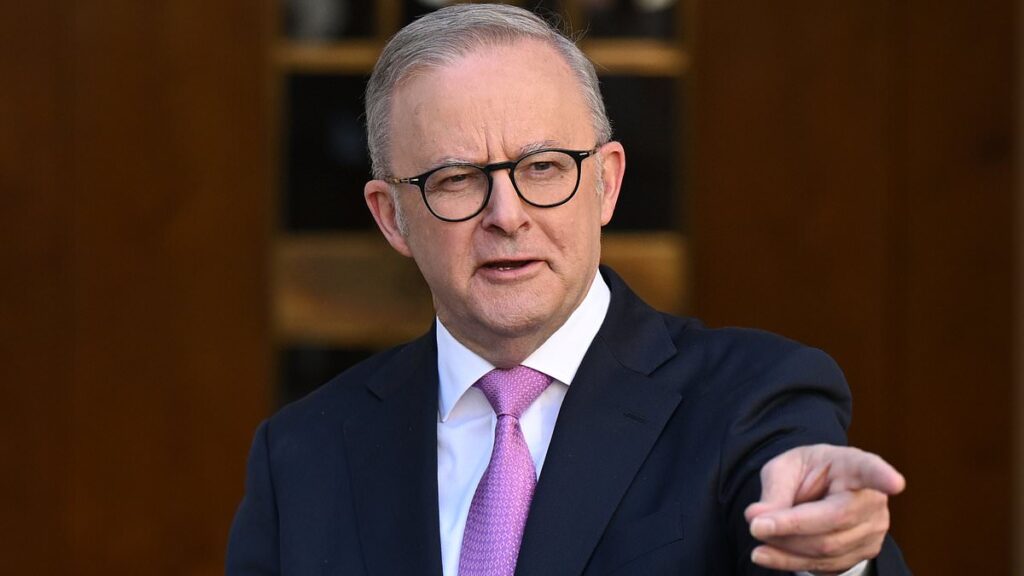Anthony Albanese could scrap Australia’s 33 per cent luxury car tax as part of a prospective free trade deal with the European Union, a Labor insider has revealed.
Petrol and diesel cars selling for more than $80,567 are slapped with the tax, while that threshold is higher for fuel-efficient vehicles like hybrids and fully electric cars.
But the re-elected government has signalled it may consider getting rid of the tax altogether.
That could lead to cheaper cars from the European Union – home to luxury car brands such as Mercedes Benz, BMW, Audi and Porsche in Germany, and Italian sportscar marques Lamborghini and Ferrari – and Japan.
The luxury car surcharge sees a basic $86,100 BMW X3 draw a $1,826 tax bill.
Professor Tim Harcourt, a chief economist at the University of Technology Sydney who was previously a trade and economics adviser to federal Labor ministers, said the re-elected Albanese Government was likely to scrap the luxury car tax.
Anthony Albanese could scrap Australia’s 33 per cent luxury car tax as part of a prospective free trade deal with the European Union , a Labor trade insider says
‘We don’t produce cars in Australia so, in some ways, the luxury car tax is a bit unusual in the sense that there’s no local competition,’ he told Daily Mail Australia.
‘The case is different for it now – you’re not protecting local industry; it’s obviously just a revenue raiser.’
Prof Harcourt, Austrade’s former chief economist who keeps in regular contact with Trade Minister Don Farrell, said scrapping the luxury car tax made sense in the context of negotiating a free trade deal with the European Union.
‘It might be part of that,’ he said. ‘I talk to Don Farrell everyday so I help him out.’
Donald Trump’s broad-based tariffs, including 10 per cent import duties on Australia, and Chinese President Xi Jinping’s since aborted 200 per cent tariffs on Australian wine, had made the traditionally-protectionist Europeans more open-minded about trade deals.
‘The Europeans are, by nature, are protectionist and they really don’t want to do too much,’ Prof Harcourt said.
‘But we’ve now got a world where it’s a little bit more uncertain and you don’t really want a big China-US trade war so the EU’s been reaching out to Canada and to us, to other like-minded countries.
‘One good thing about Donald Trump and Xi Jinping is their actions might lead to actually more trade between other nations.
Petrol and diesel cars selling for more than $80,567 are slapped with the 33 per cent luxury car tax (pictured is a Mercedes-Benz GLC)
‘Certainly, the European Union is a lot more open since Donald Trump returned to the White House.’
The luxury car tax is expected to raise $1.2billion in 2025-26, which is equal to the wine equalisation tax on the wholesale price of imported alcohol.
Australia stopped manufacturing cars in 2017 when the last Holden Commodore was made in Adelaide, meaning there’s no need for a luxury car tax to protect local jobs.
Australia and the EU have been negotiating a free trade agreement since June 2018, when the Coalition was last in power.
Since then, the EU has asked Australia to stop using using names such as feta, gorgonzola and mozzarella on Australian-made cheeses.
‘The EU has been pretty protectionist and you could send all the French cows around the world business class for the price of their common agricultural policy,’ Prof Harcourt said.
In 2019, it presented the Australian government with a list of ‘geographical indications’ that also demanded that camembert only be marketed with a small ‘c’, and that ‘Edam’ and ‘Gouda’ be banned from being paired with the name ‘Holland’.
Prosciutto, a cured ham term, would be banned from being paired with the terms ‘di Parma’, ‘di San Daniele’ and ‘Toscano’ unless these were Italian imports.
Australian food producers have broadly complied with those requests since then, which could potentially make the EU open-minded about a free-trade deal with Australia if the luxury car tax was scrapped.
